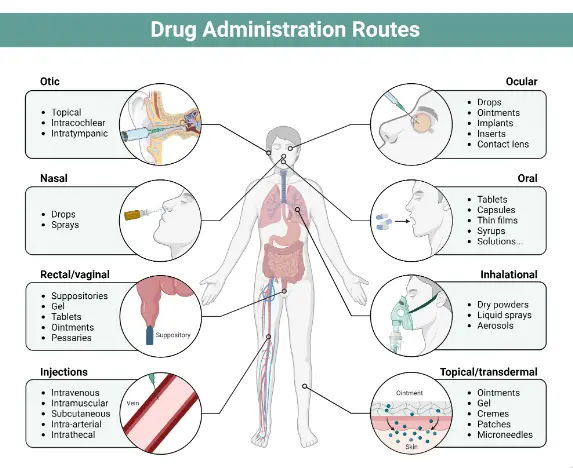The pathway through which a drug enters in the body is called route of drug administration. The major routes of the drugs administration are divided and explained in the following terms.
major routes of drug administration
- Enteral route.
- Parenteral route.
- Some other routes( inhalation, topical route vaginal, and buccal route )
The above are further divided into the following sub classes.

1. ENTERAL:
The enteral is one of the route of administration which include the sub classes like oral, sublingual and rectal.
A. Oral: The oral route is the sub route of enteral administration route of drug in which the drug is directly swallowed into the digestive tract through mouth. * *
Advantages Of Oral Route
Following are the advantages of oral route.
- It is the safe and easy route.
- Ensures better patient compliance.
- This may be cost effective.
- Longer duration of action.
- More ever it can be used for diagnostic purpose
Disadvantages Of Oral Route
Following are the disadvantages of oral route.
- It cannot be used in unconsciousness, emergency and vomiting.
- Some drugs may be destroyed by the gastric juice such as adrenalin and insulin.
- Drug through this route may pass first pass metabolism.
- Bitter and large volume drug cannot be given.
B. Sublingual: In this process the drug is placed under the tongue. the drug releases and enters the capillary network in the mouth.
Advantages Of Sublingual Route
Following Advantages of sublingual route.
- It has rapid onset of action.
- Avoid first pass metabolism.
- self medication is possible.
Disadvantages Of Sublingual Route
Following are the disadvantages of sublingual route.
- Excessive salivation.
- Irritation to oral mucosa.
- Cannot be used in unconscious patient.
C. Rectal: In the rectal route the administration of drug take through rectum.
Advantages Of Rectal Route
Following are the advantages of rectal route,.
- This route protects half of the drug from the action of liver metabolism.
- Rectal route also bypasses the stomach fluid.
- Drug through this route can be given to unconscious and children and in case of vomiting.
Disadvantages Of Rectal Route
Following are the disadvantages of rectal route.
- It is not a well accepted route and can also cause pain and irritation.
2. PARENTERAL ROUTE
The drug is administrated through other than GIT ( gastro intestinal tract) particularly through injection. The term is known as parenteral route and Similarly this is also one of the route of drug administration.
Advantages Of Parenteral Route
Following advantages of parenteral route.
- This route has rapid onset of action with maximum bioavailability.
- It is used for drug which are unstable in GIT( gastro intestinal tract) like Heparin.
- And it Avoids first pass metabolism.
- Can be used in unconscious patients.
Disadvantages Of Parenteral Route
Following are the disadvantages of parenteral route.
- May cause air embolism.
- Pain due to irritation.
- Risk of toxicity.
Sub classes of parenteral route of administration of drugs are as follows.
A. INTRAVENOUS (IV): In this drug is directly administrated into vein. The angle for this will be 350.
B. INTRAMUSCULAR (IM): Drug injected into the muscle. the angle for IM is 90.
C. SUBCUTANEOUS (SC): In this process the drug administration take place beneath the skin, above the muscle.
D. EPIDURAL: Injected into the dura matter(epidural space) of the spinal cord.
E. INTRACARDIAC: Administrated through injection into heart.
F. INTRAOCULAR: Injected into the eye through injection.
G. INTRATHECAL: Into the spaces surrounding the spinal card it would be injected.
H. INTRA ARTICULAR: Process in which drugs are injected into the joint.
3. OTHER ROUTES
Drugs can be administrates through some other routes such as Oral and nasal inhalation, topical and vaginal route.
A. Oral And Nasal Inhalation: Through this route drug is administrated into the respiratory tract. Drug should be rapidly absorbed through this route. Example albuterol.
B. Topical Route: The drug is directly applied to the skin and mucous membrane in the form of creams, ointments, transdermal patch and lotions.
C. Vaginal Route: In this process the drug is administered into female vagina e.g. Antifungal vaginal creams and tablets.
FOR video lecture click Open
Disclaimer
The information provided on this platform is for general informational purposes only and is not intended as a substitute for professional medical advice, diagnosis, or treatment. Always seek the advice of your physician or other qualified health providers with any questions you may have regarding a medical condition. Never disregard professional medical advice or delay in seeking it because of something you have read on this platform.